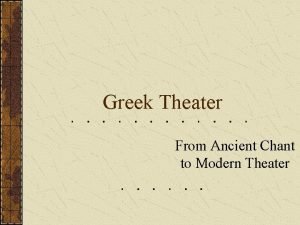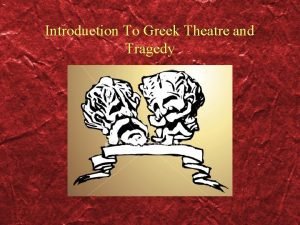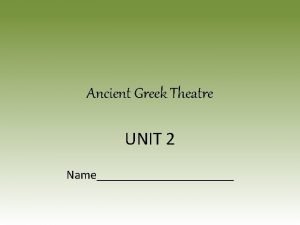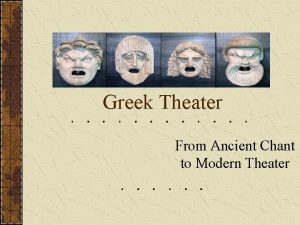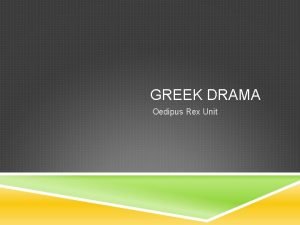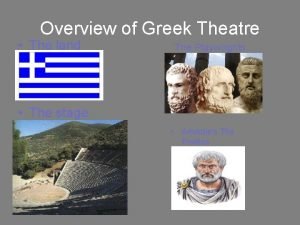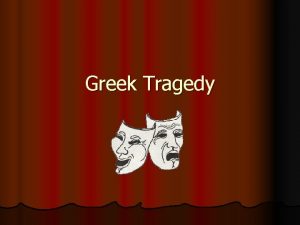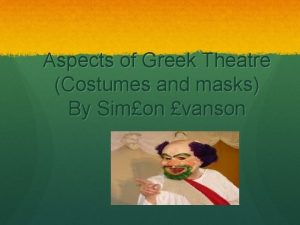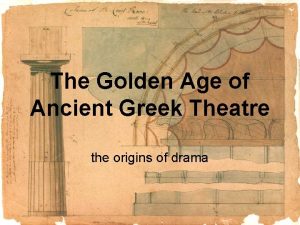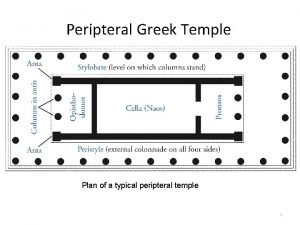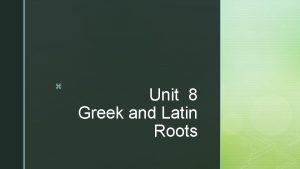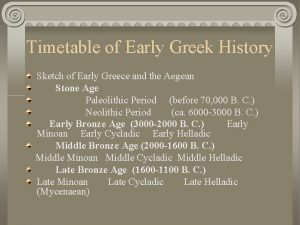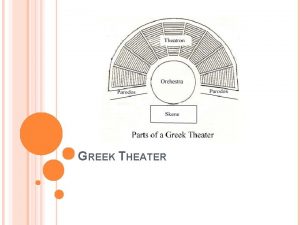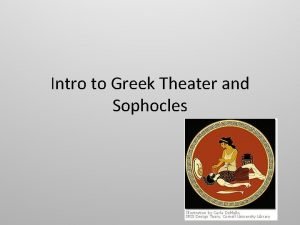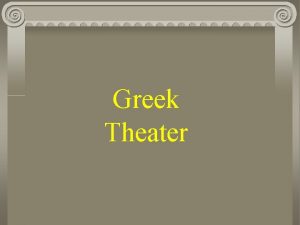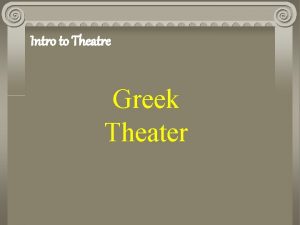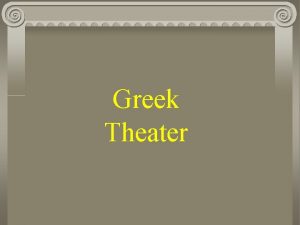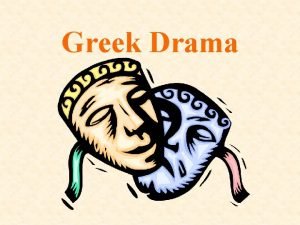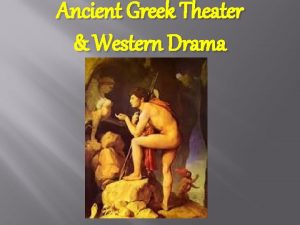Ancient Greek Theater Notes for English II Ancient






















- Slides: 22

Ancient Greek Theater Notes for English II

Ancient Greek Theater

Background l Celebration to honor Dionysus l Plays exposed arrogance and emphasized reverence for gods l Limited number of characters l No curtains for scene changes l Consistent format for productions


Presentation of Plays l Chorus: group of performers whose singing, dancing, and narration provides explanation or elaboration of the main action. l Choragos: the leader of the chorus. Often exchanged thoughts in dialogue.

Presentation of Plays l Opened with prologue (exposition) l Chorus sang parados (opening song) l First scene presented l An ode sung by chorus divided scenes

Presentation of Plays l During strophe, chorus members rotated R to L l During antistrophe, chorus members rotated L to R l Epode: final stanza in an ode l Exodos: final exiting scene

Sophocles (496 -406 BC) l Wrote 123 plays, but only 7 survive. l Wrote three tragedies called Theban plays l Oedipus Rex (Oedipus the King), Oedipus at Colonus, and Antigone l Stories were very familiar to Greeks l Dramatic focus was search for truth and self understanding.

Terms to Know l Tragedy – a play or other work which evokes strong emotions in audience by presenting a noble person who demonstrates great courage and perseverance while facing certain defeat, often death, due to a tragic flaw. Despite this, the tragic hero often gains selfknowledge and wisdom.

Terms to Know: Tragedy l Usually focused on suffering of major character and ends in disaster. l Linked with religious ritual and artistic performance l Uses poetic language and song

Terms to Know: Tragedy l Believed the good will of the Gods determined welfare. l Reverence/religious duty/patriotism are all linked l Characters are larger than life, often universal (relatable) l Often based on myth

Terms to Know l. Aristotle defined tragedy as a dramatic presentation that arouses pity and fear in the audience l. Catharsis – emotional relief or purification experienced by the audience upon watching the tragedy

Terms to Know l Tragic hero – a person of stature or significance who is undone either by some personal flaw, such as hubris, or by the will of gods (i. e. : fate) l Tragic flaw – the defect or error of a tragic hero that leads to his or her downfall; Greeks called it hamartia

Terms to Know l Protagonist – main character at center of action l Antagonist – character or force in conflict with protagonist l Peripetia – a sudden change of fortune

Terms to Know l Dramatic Irony – occurs when the reader or audience knows something important that a character does not know. l In Oedipus Rex, the fundamental irony stems from the audience’s knowledge of Oedipus’ true identity while Oedipus is unaware of it.

Oedipus Rex and Sophocles’ Theban Trilogy

The Story of Oedipus l A prophecy stated that baby Oedipus was destined to kill his father (Laius) and marry his mother (Jocasta), the king and queen of Thebes. l They assign a shepherd to leave the baby atop a mountain to die to avoid the fate.

The Story of Oedipus l The shepherd showed pity, giving the child to a messenger who took the baby to the king and queen of Corinth. l They named Oedipus and raised him as their own. l Hearing rumor of the prophecy, he leaves Corinth as a young man, not knowing his true identity.

The Story of Oedipus l During his travels, Oedipus encountered a small group of men at a crossroads, and killed all but one after a confrontation l Unbeknownst to Oedipus, one of the men he killed was Laius, king of Thebes and his birth father.

The Story of Oedipus l As he approached Thebes, he solved the riddle of the Sphinx, which had terrorized the city. l“What walks on four legs in the morning, two legs at noon, and three in the evening? ”

The Story of Oedipus l Oedipus was welcomed as a hero by the city of Thebes and given the hand of the recently widowed queen, Jocasta. l The play Oedipus Rex begins many years after this. Oedipus and Jocasta have four children together.

Themes: Oedipus Rex l The quest for identity l The nature of innocence and guilt l The nature of moral responsibility l The limitations of human will and fate l The abuse of power
 Greek theater vs modern theater
Greek theater vs modern theater Theatron greek theatre definition
Theatron greek theatre definition What were greek masks made of
What were greek masks made of When did greek theatre begin
When did greek theatre begin Mechane greek theatre
Mechane greek theatre Ancient greek theater masks
Ancient greek theater masks Ancient greek theater
Ancient greek theater Ancient greek masks
Ancient greek masks Greek theatre stage
Greek theatre stage Function of greek theater
Function of greek theater Parts of greek theater
Parts of greek theater Exodus definition greek theatre
Exodus definition greek theatre Greek tragedy costumes
Greek tragedy costumes Eccyclema greek theatre
Eccyclema greek theatre Peripteral temple
Peripteral temple Greek theatre conventions
Greek theatre conventions Greek theater architecture
Greek theater architecture Ancient greek theatre history
Ancient greek theatre history Greek theater weather
Greek theater weather Unit 8 greek and latin roots
Unit 8 greek and latin roots Characteristics of greek theater
Characteristics of greek theater Theatre bio
Theatre bio What is a greek tragedy
What is a greek tragedy
